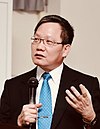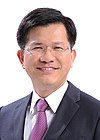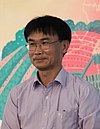Second Su cabinet
Second Su cabinet | |
|---|---|
50st premiership of Republic of China (ROC) | |
 | |
| Date formed | 14 January 2019 |
| Date dissolved | 31 January 2023 |
| People and organisations | |
| President | Tsai Ing-wen |
| Head of government | Su Tseng-chang |
| Deputy head of government | Chen Chi-mai Shen Jong-chin |
| Total no. of members | ? |
| Member parties | Democratic Progressive Party (DPP) |
| Status in legislature | DPP majority, pan-green majority |
| Opposition parties | Kuomintang |
| Opposition leader | Johnny Chiang (2020-2021) Eric Chu (since 2021) |
| History | |
| Election(s) | 2016 Taiwanese legislative election |
| Legislature term(s) | Ninth Legislative Yuan |
| Predecessor | Lai cabinet |
| Successor | Chen Chien-jen cabinet[1] |
Su Tseng-chang was appointed to the premiership on 14 January 2019 by President Tsai Ing-wen. He succeeded William Lai, who had resigned in response to the Democratic Progressive Party's poor performance in the 2018 Taiwanese local elections. This is his second tenure of premiership, as he had served as premier under President Chen Shui-bian from 2006 to 2007 with Tsai Ing-wen, the current president, as his deputy. At the age of 71, he is the third oldest individual (after Lee Huan and Chen Chien-jen) to assume the office.
Su's premiership has led to an increase in approval of the Tsai administration. Recent polls showed an 8.5 percentage point increase in approval of the Tsai administration, with an approval rating of 43 percent. As premier, Su has an approval rating of 53 percent.[2]
Members[edit]
Leaders[edit]
| Name | Leader | |||
|---|---|---|---|---|
| English Name | Chinese | |||
| Premier | 院長 | Su Tseng-chang | 
| |
| Vice Premier | 副院長 | Chen Chi-mai (2019-2020) |

| |
| Shen Jong-chin (2020–2023) |

| |||
| Secretary-General | 秘書長 | Li Meng-yen | 
| |
Ministries[edit]
| Name | Minister | |||
|---|---|---|---|---|
| English Name | Chinese | |||
| Interior | 內政部 | Hsu Kuo-yung (2019 - 2022) |

| |
| Hua Ching-chun (2022–2023) |

| |||
| Foreign Affairs | 外交部 | Joseph Wu | 
| |
| National Defense | 國防部 | Yen Teh-fa (2019 - 2021) |

| |
| Chiu Kuo-cheng (2021–present) |

| |||
| Finance | 財政部 | Su Jain-rong (2019 - 2022) |

| |
| Frank Juan (2022–2023) |

| |||
| Education | 教育部 | Pan Wen-chung | 
| |
| Justice | 法務部 | Tsai Ching-hsiang | 
| |
| Economic Affairs | 經濟部 | Shen Jong-chin (2019 - 2020) |

| |
| Wang Mei-hua (2020–present) |

| |||
| Transportation and Communications | 交通部 | Lin Chia-lung (2019 - 2021) |

| |
| Wang Kwo-tsai (2021–present) |

| |||
| Labor | 勞動部 | Hsu Ming-chun | 
| |
| Health and Welfare | 衛生福利部 | Chen Shih-chung (2019 - 2022) |

| |
| Hsueh Jui-yuan (2022–present) |

| |||
| Culture | 文化部 | Cheng Li-chun (2019 - 2020) |

| |
| Lee Yung-te (2020–present) |

| |||
| Science and Technology (abolished in 2022) |
科技部 | Chen Liang-gee (2019 - 2020) |

| |
| Wu Tsung-tsong (2020–2022) |

| |||
| Digital Affairs (established in 2022) |
數位發展部 | Audrey Tang | ||
Councils and Commissions[edit]
Empowered by various laws, or even the Constitution, under the Executive Yuan Council several individual boards are formed to enforce different executive functions of the government. Unless regulated otherwise, the chairs are appointed by and answer to the Premier. The committee members of the boards are usually (a) governmental officials for the purpose of interdepartmental coordination and cooperation; or (b) creditable professionals for their reputation and independence.
| Name | Chair | |||
|---|---|---|---|---|
| English Name | Chinese | |||
| 農業委員會 | Chen Chi-chung | 
| ||
| National Development Council | 國家發展委員會 | Chen Mei-ling (2019 - 2020) |

| |
| Kung Ming-hsin (2020–present) |

| |||
| Mainland Affairs Council | 大陸委員會 | Chen Ming-tong (2019 - 2021) |

| |
| Chiu Tai-san (2021–present) |

| |||
| Financial Supervisory Commission | 金融監督管理委員會 | Wellington Koo (2019 - 2020) |

| |
| Huang Tien-Mu (2020–present) |

| |||
| Ocean Affairs Council | 海洋委員會 | Chou Mei-wu (acting) | 
| |
| Overseas Community Affairs Council | 僑務委員會 | Wu Hsin-hsing (2019 - 2020) |

| |
| Tung Chen-yuan (2020–present) |

| |||
| Veterans Affairs Council | 國軍退除役官兵輔導委員會 | Chiu Kuo-cheng (2019) |

| |
| Feng Shih-kuan (2019–present) |

| |||
| Council of Indigenous Peoples | 原住民族委員會 | Icyang Parod | 
| |
| Hakka Affairs Council | 客家委員會 | Lee Yung-te (2019 - 2020) |

| |
| Yiong Con-ziin (2020–present) |

| |||
| 公共工程委員會 | Wu Tze-cheng | 
| ||
| 原子能委員會 | Hsieh Shou-shing | 
| ||
| Science and Technology Council (2022- ) | 國家科學及技術委員會 (2022- ) | Wu Tsung-tsong | 
| |
Independent Commissions[edit]
There are, or would be, independent executive commissions under the Executive Yuan Council. The chiefs of these five institutions would not be affected by any change of the Premier. However, the related organic laws are currently under revision.
| Name | Chair | |||
|---|---|---|---|---|
| English Name | Chinese | |||
| Central Election Commission | 中央選舉委員會 | Lee Chin-yung | 
| |
| Fair Trade Commission | 公平交易委員會 | Huang Mei-ying | ||
| National Communications Commission | 國家通訊傳播委員會 | Chen Yaw-shyang | 
| |
Other organs[edit]
| Name | Leader | |||
|---|---|---|---|---|
| English Name | Chinese | |||
| 環境保護署 | Chang Tzi-chin | |||
| Central Bank | 中央銀行 | Yang Chin-long | 
| |
| National Palace Museum | 國立故宮博物院 | Wu Mi-cha | 
| |
| Directorate-General of Budget, Accounting and Statistics | 主計總處 | Chu Tzer-ming | ||
| Directorate-General of Personnel Administration | 人事行政總處 | Jay N. Shih | ||
References[edit]
- ^ "Ex-VP Chen Chien-jen appointed premier - Focus Taiwan". focustaiwan.tw. 27 January 2023. Retrieved 27 January 2023.
- ^ [1] Pan, Jason. (May 20, 2019). "Tsai’s approval rating rising, poll shows." Taipei Times. Retrieved May 30, 2019.
